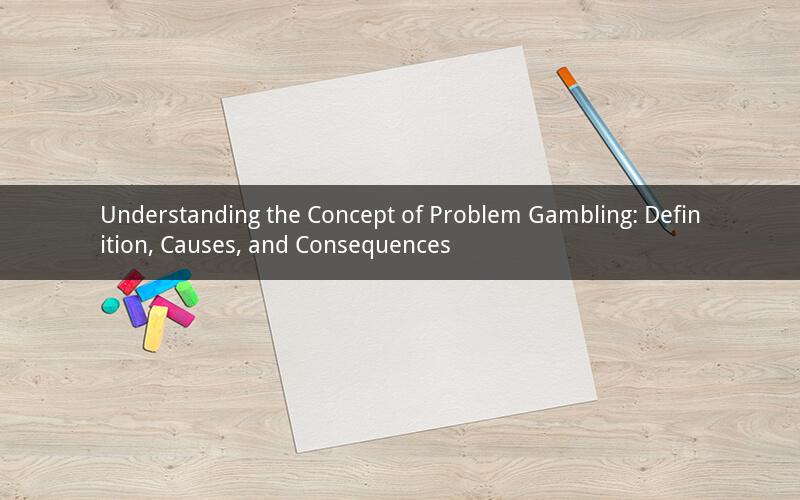
Problem gambling, also known as pathological gambling or compulsive gambling, is a growing concern in today's society. This article aims to delve into the definition of problem gambling, explore its causes, and discuss the consequences it brings to individuals, families, and communities.
Definition of Problem Gambling
Problem gambling refers to a pattern of gambling behavior that leads to significant harm or distress. It is characterized by a preoccupation with gambling, a need to increase the amount of money or time spent gambling, and a failure to stop despite negative consequences. According to the American Psychiatric Association's Diagnostic and Statistical Manual of Mental Disorders (DSM-5), problem gambling is classified as a mental health disorder.
Causes of Problem Gambling
Several factors contribute to the development of problem gambling. These include:
1. Genetic predisposition: Research indicates that there is a genetic component to problem gambling, with a higher prevalence of the disorder among individuals with a family history of gambling problems.
2. Environmental factors: Access to gambling opportunities, exposure to gambling-related media, and the availability of gambling venues can contribute to the development of problem gambling.
3. Psychological factors: Individuals with certain personality traits, such as impulsivity, risk-taking behavior, and low self-esteem, may be more susceptible to developing gambling problems.
4. Social factors: Peer pressure, the desire to belong to a group, and the pursuit of excitement can also contribute to the onset of problem gambling.
Consequences of Problem Gambling
The consequences of problem gambling are far-reaching and can affect various aspects of an individual's life:
1. Financial consequences: Problem gamblers may experience significant financial losses, leading to debt, bankruptcy, and financial instability.
2. Emotional consequences: The stress and anxiety associated with problem gambling can lead to mood disorders, depression, and anxiety.
3. Social consequences: Problem gambling can strain relationships with family and friends, leading to social isolation and alienation.
4. Health consequences: Problem gambling can contribute to physical health issues, such as heart disease, stroke, and other stress-related conditions.
5. Legal consequences: Problem gamblers may engage in illegal activities to support their gambling habits, leading to legal problems and potential imprisonment.
Questions and Answers
1. Q: Can problem gambling be treated?
A: Yes, problem gambling can be treated. Various forms of therapy, such as cognitive-behavioral therapy, family therapy, and support groups, have been shown to be effective in helping individuals overcome their gambling problems.
2. Q: Is problem gambling more common in certain demographics?
A: While problem gambling can affect anyone, certain demographics, such as men, individuals with a family history of gambling problems, and those with mental health disorders, may be more susceptible to developing gambling issues.
3. Q: How can I identify if someone has a problem with gambling?
A: Look for signs such as preoccupation with gambling, secretive behavior, increased debt, and a decline in personal and professional responsibilities. If you suspect someone has a gambling problem, encourage them to seek help.
4. Q: Can problem gambling be prevented?
A: While there is no guaranteed way to prevent problem gambling, individuals can take steps to reduce their risk, such as setting limits on gambling activities and seeking support from friends and family.
5. Q: Is there a difference between problem gambling and addiction?
A: Yes, there is a difference. Problem gambling is characterized by the negative consequences of gambling behavior, while addiction refers to a chronic, relapsing disorder characterized by compulsive drug-seeking and drug-taking behavior. Problem gambling can lead to addiction if left untreated.